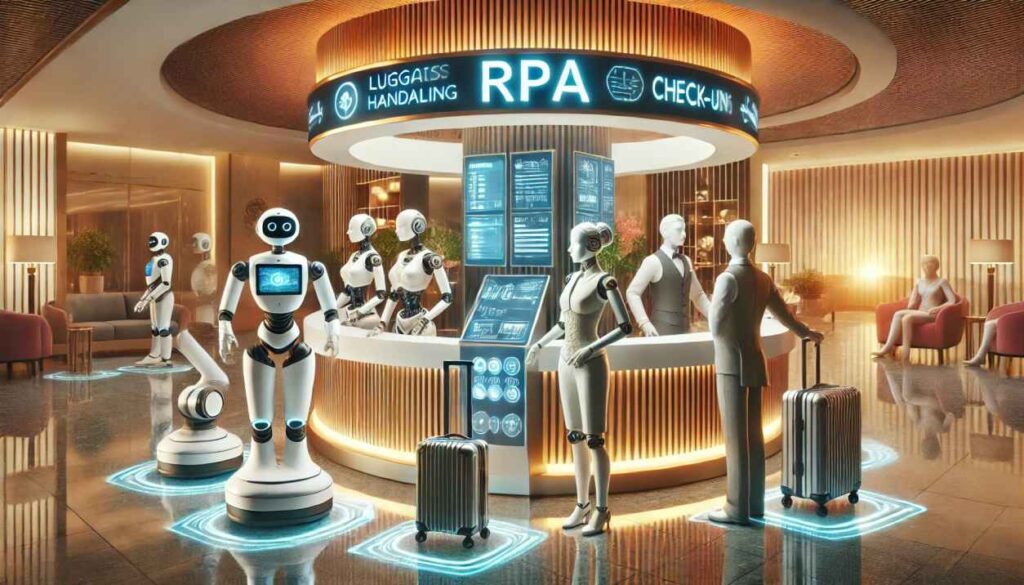The hospitality industry is highly competitive, customer satisfaction and operational efficiency are the essence of the business and so the integration of modern technologies is inevitable. One of the technologies that can bring a shift is RPA, this innovation has become one that has shifted the focus and brought efficiency, better guest experience, and revenue to hotels and other businesses in this sector.
What Is RPA?
RPA can be defined as the application of software robots or ‘bots’ to perform manual, rule-based processes originally done by humans. Unlike the physical robots, RPA robotic process automation works on a digital platform; and it can easily interface and continue working with other software and applications thereby flawlessly performing the task. Some of the popular software currently offering this solution are Blue Prism RPA and UiPath RPA.
How Does RPA Work in Hospitality?
Many branches exist within the hospitality industry: management of the front desk; cleaning services; reservations; promotion; and accounting. Challenges across these domains can indeed be solved by RPA services so that businesses can dedicate more efforts toward enhancing guest experiences.
1. Efficiencies in Reservation Management
The job of managing channels that include direct booking channels, third-party, corporate, and even associates can be very difficult. RPA services help automate this process by:
- Merging reservation information from different channels into one.
- Minimizing human interactions and errors like overbooking, or having wrong information about the guests.
- Availability and price of the rooms can be updated on real real-time basis.
2. Improving Guest Registration and Departure
The check-in and check-out operation might be well to do specifically with visitors. RPA solutions enable seamless experiences by automating:
- AI-based document scanning for ID verification assessment of the guest’s identity.
- Admission to rooms according to the preferences and availability of the rooms per time.
- Facilitating the transaction helping with the payment processing and executing of invoices.
Hotels using RPA can implant these automatized processes within the current PMS and guests we checked in will not spend much time at the reception desk.
3. Functional Housekeeping Management
Cleaning services occupy a significant position within the hotel organization since they relate to guest satisfaction. RPA can optimize this by:
- Scheduling of room cleaning using occupancy information and decision-making.
- Reporting to the housekeeping staff on details of the guest’s request in real-time.
- Supervise the stocks of housekeeping necessities and provide automatic orders for restocking.
4. Personalized Marketing Campaigns
Hospitality companies can only get a competitive edge through customization, particularly in reaching consumers. RPA robotic process automation means that hotels can handle guest data as a tool for proper marketing strategy. By:
- Segmenting guest according to their preference and characteristics
- Reduce the time it takes to review customer profiles for promotional offers.
- Sending messages/emails and offers.
Using RPA, hotels can improve customer interaction and sales, thus improving overall revenue.
5. Financial Operation and Compliance
Tasks like invoicing or payroll services with regular statutory and management reports contribute to the company’s performance yet are non-revenue generating. RPA services can automate these processes to:
- Provide accurate financial statements.
- Pay staff adequately as well as effectively handle their payroll without failures.
- Compliance with laws of the respective country and general taxation and labor laws.
RPA can help hotels guarantee efficient, accurate, and timely financial processes.
6. Guest Feedback and Reviews
The opinions of guests who stayed in the hotel bring useful information about customers’ needs. RPA solutions can assist in:
- Supervising online reviews.
- Sorting feedback into actionable insights.
- Replying to reviews automatically to improve the image of the brand.
What Are The Advantages of RPA in the Hospitality Industry?
Adopting RPA in hospitality and hotel management brings numerous benefits, especially with good RPA development services. Some advantages are:
- Cost Savings: By automating tasks, hotels save labor costs and can focus on more important tasks.
- Increased Accuracy: Bots get rid of human error in services such as billing, reservation, and inventory.
- Scalability: RPA systems are very effective when working on extra-sized loads during holidays or occasions that come with a packed workload.
- Enhanced Guest Satisfaction: RPA offers quicker service delivery and better guest satisfaction.
- Improved Employee Productivity: Hospitality staff can be free to interact with guests and pursue and execute strategic activities without being tangled with trivial paperwork.
Why Choose RPA For Better Hospitality Services?
There are several benefits of RPA, nevertheless, its successful execution depends on the strategic process. Key considerations include:
- Identifying Processes for Automation: Not every process can be automated through RPA, identify repetitive tasks that need automation.
- Choosing the Right RPA Tool: Compare RPA taking into mind the compatibility, adaptability, and affordability.
- Employee Training: Make sure that employees know how to interact with the RPA system and how to handle arising issues.
- Data Security: Ensure the confidentiality of a guest by adopting secure network standards to secure a guest’s data.
What Are The Real-life Implementation of RPA in Hospitality?
Several global hotel chains and hospitality businesses have successfully embraced RPA:
- Hilton Hotels: Integrated RPA in their recruitment process which helped to decrease the time to shortlist candidates.
- Accor Hotels: Building on RPA to optimize the back office processes like invoicing and accounts payable, decreasing the expenses tremendously.
- Marriott International: Implemented RPA in the management of their loyalty programs and was able to offer higher and more efficient services to the program members.
Conclusion
Robotic Process Automation is changing the hospitality and hotel management sector significantly. Therefore, by reducing routine activities, increased operation effectiveness, and better customer satisfaction RPA makes hotels ready to compete in today’s environment. Partnering with RPA development services businesses can implement excellent compatibility and sound performance across different departments. The time to jump on the RPA bandwagon is now. Armed with the proper approach and technology, businesses will be capable of achieving the levels of productivity those hotels today need and providing service levels that today’s travelers demand.




